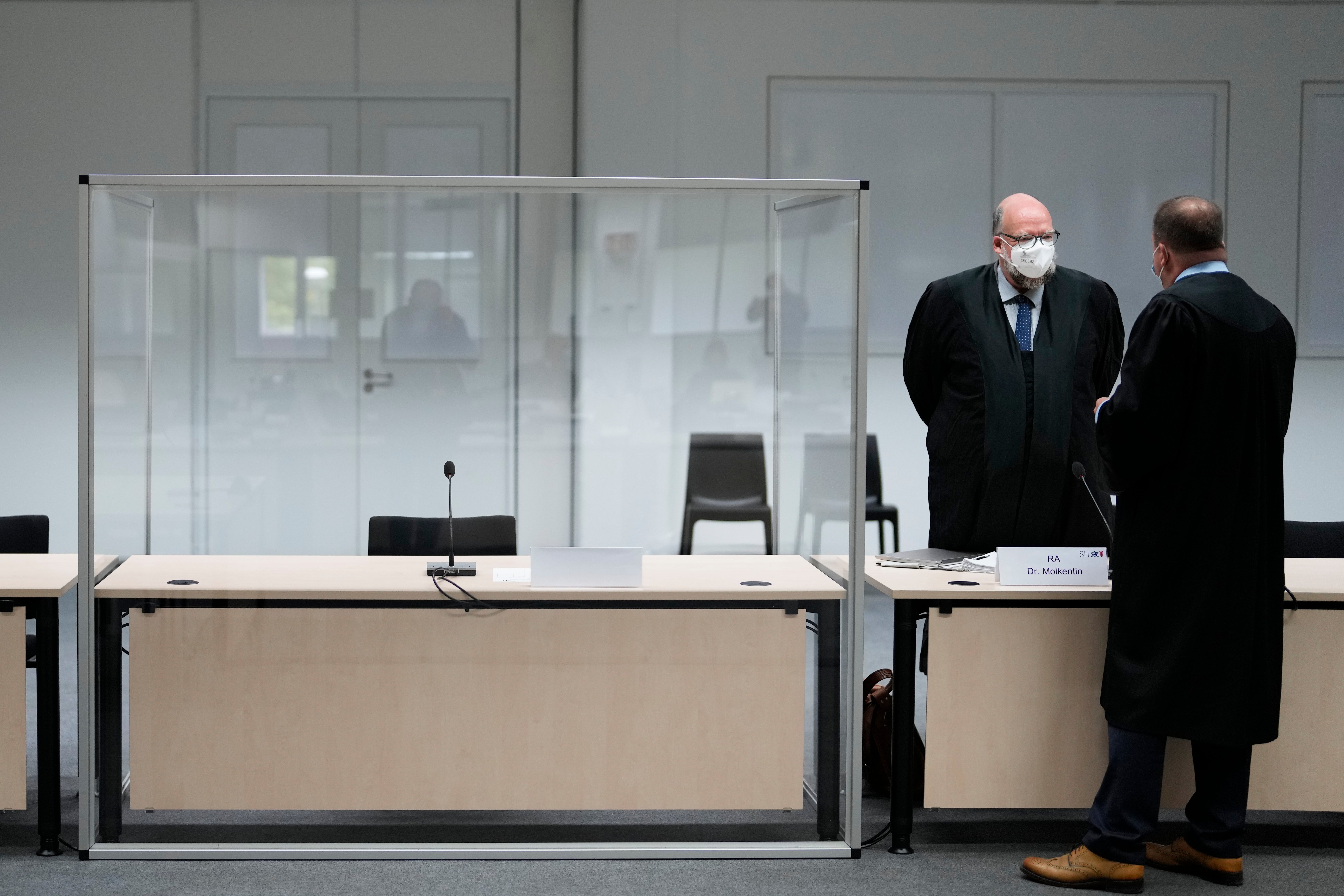Former Nazi concentration camp secretary, 96, caught after fleeing trial
Irmgard Furchner is facing trial on assisting murder in more than 11,000 cases

A 96-year-old German woman facing charges in a juvenile court of aiding and abetting the murder of thousands of Nazi concentration camp prisoners was caught and detained by police several hours after she fled from her nursing home on Thursday just as her trial was about to start.
Irmgard Furchner, who worked as a secretary at the Stutthof concentration camp when she was 18, was detained by police as she was walking alongside a busy road in the same town as her nursing home – Itzehoe. She was taken to police headquarters for questioning, according to a report in Bild newspaper.
Earlier on Thursday just hours before her trail was set to begin, Ms Furchner made a dramatic and unexpected escape. Authorities announced that she had failed to arrive at a local court when scheduled, even though she had left her nursing home in Quickborn, Pinneberg, in a taxi. An arrest warrant was then issued for the elderly woman.
“The accused suspect is on the run,” Friederike Milhoffer, a spokesperson for the court in Quickborn, had told reporters at the court house stunned by the turn of events that delayed the start of the trial. “She took a taxi in the morning and was heading towards the train station.” Officials say that they had been unable to trace her journey after that.
There were more than 50 journalists and spectators waiting for the start of the trial inside the courthouse – including 12 people representing joint plaintiffs. The trial was set for 37 days of testimony and was expected to last until next June.
“The defendant is leading the court by the nose with her behaviour,” said Onur Ozata, a lawyer representing two of the joint plaintiffs, annoyed by the ease with which Ms Furchner had briefly escaped justice. “She doesn’t feel bound by the law. The authorities have got to do everything they can because anything less would be unbearable for survivors of the camp.”
In one of the last trials of people charged with aiding and abetting murder in the Nazi’s camps, Ms Furchner has been accused by prosecutors of assisting murder in 11,387 cases and complicity in seven cases of attempted murder while she worked as the first secretary to the Stutthof concentration camp commandant, SS Major Paul Werner Hoppe.
In an unusual twist, Ms Furchner is being tried in the juvenile chamber of the district court because she was only 18 when she began working at the camp in 1943. She had previously worked in a similar capacity for Dresdner Bank in Marienburg, which is now Malbork in Poland.
Only in the last decade or so have German prosecutors brought charges against a number of former concentration overseers, even if they had only played minor roles. It is seen as a last chance to get justice for the millions killed during the Holocaust.
The efforts to track down supporting figures began in earnest after the precedent-setting trial of John Demjanjuk, a former camp guard at Sobibor death camp, who was convicted in 2011 of aiding and abetting the murders of 28,000 people.
Earlier this year, prosecutors charged a 100-year-old man with being an accessory to 3,518 murders while he was allegedly a guard at the Sachsenhausen concentration camp during the Second World War.
Ms Furchner has insisted to prosecutors that she did not know of any executions at the camp or about the systematic killing of Jewish prisoners, Polish partisans and Soviet prisoners of war even though, according to German media reports, her office had a view of the camp’s crematorium. More than 65,000 prisoners were killed at the camp, according to the German Nazi documentation centre in Ludwigsburg.
Her lawyers were expected to defend Ms Furchner in court by saying she was simply a small cog in the machinery, a clerical worker who simply wrote and read letters for Hoppe but never hurt anyone in the camp or was aware of what was happening.
“I was the stenographer for Commandant Hoppe and his assistants but did most of my work for Hoppe,” Ms Furchner testified as a witness in 1954 in an earlier trial against the camp leaders, adding she knew nothing of the camp killings. “I handled all the correspondence with the SS Economic Administration Office.”
Yet state prosecutor Maxi Wantzen has said that Hoppe was responsible for carrying out the execution orders at the camp, compiling deportation lists for Auschwitz-Birkenau and ordering mass murder through poison gas at the Stutthof gas chamber. Others at the camp were shot, hanged, or tortured to death under his orders.
Ms Furchner had passed a recent physical examination after an earlier test had postponed any trial because she was found to be suffering from cardiovascular problems.
She met her future husband at the camp – an SS officer named Heinz Furchtner who was two decades her senior. They married in 1954. He died in 1972. She moved into the nursing home in 2014.
Efraim Zuroff, the head Nazi hunter at the Simon Wiesenthal Center’s office in Jerusalem, said that “if she is healthy enough to flee, she is healthy enough to be incarcerated”. Her flight, he added, “should also affect the punishment”.
Subscribe to Independent Premium to bookmark this article
Want to bookmark your favourite articles and stories to read or reference later? Start your Independent Premium subscription today.

Join our commenting forum
Join thought-provoking conversations, follow other Independent readers and see their replies